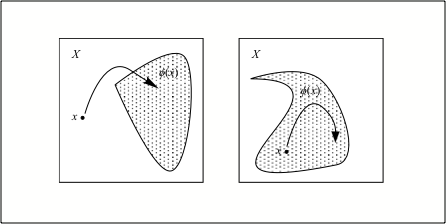
Abstract
When all players are rational and their rationality is common knowledge, the resulting outcome will be rationalizable. If a player does not correctly forecast the play of an opponent, her beliefs to which she played a best response were incorrect. Her actual action may not be a best response to the actual play of her opponents. Therefore in a rationalizable outcome one or more players can have ex post regret about their choices.
When rational players correctly forecast the strategies of their opponents, they are not merely playing best responses to their beliefs about their opponents’ play; they are playing best responses to the actual play of their opponents. When all players correctly forecast their opponents’ strategies, and play best responses to these forecasts, the resulting strategy profile is a Nash equilibrium.
Nash equilibrium has been justified as representing a self-enforcing agreement. I present an example of Aumann’s intended to show that a Nash equilibrium need not be self-enforcing. Nash equilibria can also be vulnerable to multiplayer deviations. We discuss a difficulty of justifying Nash equilibrium as the outcome of a dynamic process: if it is known that the game is repeated, then the repeated game is itself a new, more-complicated game.
A game need not have a pure-strategy Nash equilibrium. However, every strategic-form game does have a (possibly degenerate) mixed-strategy Nash equilibrium. We learn (thanks to John Nash) that a Nash equilibrium exists if and only if there exists a fixed point of a particular best-response correspondence. Kakutani’s fixed-point theorem guarantees the existence of this fixed point when the correspondence satisfies certain conditions. We verify that the best-response correspondence satisfies the Kakutani conditions and hence prove the existence of a Nash equilibrium.






